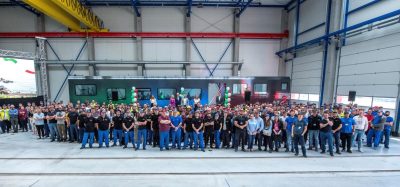AIRadio Uses Rajant Kinetic Mesh for IMM’S M8 Wi-Fi
Posted: 6 November 2023 | Emily Budgen | No comments yet
AIRadio are using Rajant’s Kinetic Mesh for Istanbul’s M8 Metro Line wi-fi, which will provide better connection for streaming passengers.


Rajant Corporation, the pioneer of Kinetic Mesh wireless networks and global distribution partner AIRadio, has solved the Istanbul Metropolitan Municipality (IMM)’s Metro M8 line connectivity challenge, making reliable Wi-Fi available to all commuters. Using Rajant’s Kinetic Mesh wireless radio nodes, known as Hawk BreadCrumbs®, all M8 passengers can access 300Mbps of uninterrupted internet while traveling at high speeds underground. IMM debuted the Rajant-enabled Wi-Fi commuter service on 17th August 2023.
Rajant Corporation is the broadband communications technology company that invented Kinetic Mesh® networking, BreadCrumb® wireless nodes, and InstaMesh® networking software. With Rajant, customers can rapidly deploy a highly adaptable and scalable network that leverages the power of real-time data to deliver on-demand, mission-critical business intelligence. A low-latency, high-throughput, and secure solution for a variety of data, voice, video, and autonomous applications, Rajant’s Kinetic Mesh networks aim to provide industrial customers with full mobility, allowing them to take their private network applications and data anywhere. With successful deployments in more than 80 countries for customers in military, mining, ports, rail, oil & gas, petrochemical plants, municipalities, and agriculture. Rajant is headquartered in Malvern, Pennsylvania, with additional facilities and offices in Arizona and Kentucky.
IMM is pointing out that the internet infrastructure put in place by AIRadio within the Metro cars and terminal is of great importance for day-to-day communication needs as well as emergencies.
AIRadio is based in the United Arab Emirates and is a member of AIR Group, headquartered in Chicago, Illinois. AIRadio is a technology company that began in 1990 and has since grown to direct offices in twelve countries and partners in over 60 countries all over the world, including the US, Africa, Europe, and the Middle East.
“Thanks to the infrastructural investments we have made, 2.5 million passengers traveling by the metros will enjoy the internet as they can use it more efficiently,” said Erol Ozguner, CIO at IMM.
Nihat Narin, the President of ISTTELKOM, Subsidiary of IMM, stressed the desire to make the commuter travel experience more contemporary and comfortable by further expanding the free IMM Wi-Fi service on the metros.
“We are working non-stop with a view to encouraging the people of Istanbul to prefer the rail systems more often, as we further improve the technological infrastructure of the city,” noted Mr Narin.
“Deploying a dedicated LTE or even a 5G network was not an option due to challenges, such as CAPEX and OPEX costs. Further, neither LTE or 5G provide seamless handoffs to maintain user-application connections, whether for entertainment like Netflix or live-streamed Google Meet,” AIRadio VP Sales and Business Development Koral Turkkan shared. “As a distributor of Rajant, we know Kinetic Mesh is a truly disruptive technology that has delivered several very large project wins for AIRadio, so we brought this high bandwidth wireless solution to IMM’s attention. Now, the M8 metro line’s 40,000+ daily passengers have the convenience and peace-of-mind access to the internet as they rapidly travel underground. A first ever real-time video conference between Turkey, Kazakhstan, and South Africa was captured using Google Meet.”
“Rajant Kinetic Mesh BreadCrumb wireless nodes have seen extensive deployments supporting high-mobility applications for underground and tunnel environments,” said Rajant Sales Director in Eastern Europe/Central Asia Marcin Kusztal.
“In the case of the Istanbul Metro, AIRadio installed Hawk BreadCrumbs in combination with Rajant RCP tunnel antennas and SlipStream XG for both trackside and on-train deployment, which exceeded the required average throughput per customer, per train,” Kusztal concluded.
More Like This
CGI Heads Trial Hybrid/Cellular Delivery for Train Connectivity
ALLRAIL and Transdev Welcome The Mobility Sphere
Southeastern Rail Teams with Siemens Mobility and Eversholt Rail
Related topics
5G, Artificial Intelligence (AI), Big Data, Digitalisation, Passenger Experience/Satisfaction, Passenger Information Systems (PIS), Real-Time Passenger Information (RTPI), Technology & Software, Wi-Fi
Related organisations
AIRadio, Istanbul Metropolitan Municipality (IMM), Rajant Corporation








